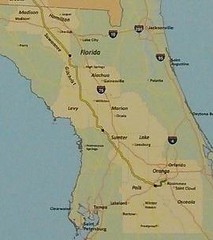Cost already sunk Kewaunee, Calvert Cliffs, Crystal River, and are gnawing
away at San Onofre: now it looks like new owner Duke is not
likely to build Progress Energy's Levy County, Florida reactor.
All that plus even in Georgia, even against all-powerful Georgia Power,
there's a reaction against the cost of the always-later always-more-expensive
new nukes at Plant Vogtle on the Savannah River.
A reaction that's getting written up in the Valdosta Daily Times.
In the VDT today from AP,
Some leaders souring on nuclear power costs.
I'm quoting from the abcNews version
because it includes the author's name, Ray Henry,
and the original date, 3 March 2013.
I added all the links and images.
 As the cost of building a new nuclear plant soars, there are signs
of buyer's remorse.
As the cost of building a new nuclear plant soars, there are signs
of buyer's remorse.
The second-guessing from officials in Georgia and Florida is a sign
that maybe the nation is not quite ready for a nuclear renaissance.
On top of construction costs running much higher than expected, the
price of natural gas has plummeted, making it tough for nuclear
plants to compete in the energy market.
In Georgia last week, Southern Co. told regulators it needed to
raise its construction budget for Plant Vogtle in eastern Georgia by
$737 million to $6.85 billion. At about the same time, a Georgia
lawmaker sought to penalize the company for going over budget,
announcing a proposal to cut into Southern Co.'s profits by trimming
some of the money its subsidiary Georgia Power makes.
And Southern Company and Georgia Power slipped the Plant Vogtle schedule
still more,
from 15 to 19 months late.
The legislation has a coalition of tea party, conservative and
consumer advocacy groups behind it, but faces a tough sale in the
Republican-controlled General Assembly. GOP Rep. Jeff Chapman found
just a single co-sponsor, Democratic Rep. Karla Drenner.
 That's
HB 267: Financing costs; construction of nuclear generating plant.
And AP failed to mention
Georgia Sierra Club's support for HB 267.
That's
HB 267: Financing costs; construction of nuclear generating plant.
And AP failed to mention
Georgia Sierra Club's support for HB 267.
As a regulated monopoly, Georgia Power currently earns about 11
percent in profits when it invests its own money into power
projects. Chapman's legislation would reduce those profits if the
nuclear project is over budget, as is the current projection.
In Florida, there's a move to completely
eliminate Construction Work in Progress (CWIP)
such as is being used in Georgia to pre-fund the new Plant Vogtle nukes.
In Florida, lawmakers want to end the practice of utilities
collecting fees from customers before any electricity is produced.
Florida only recently got CWIP, but Progress Energy has been quick to profit by it:
Continue reading →
 That’s the same Sterling Ivey who announced 2 August 2013 that
Duke’s Levy County nuclear plants were cancelled
(
Duke Energy Cancels $24.7B Florida Nuke Plant Project,
ENRSoutheast,
08/02/2013,
by Scott Judy).
A few days later,
Florida PSC approved a rate hike to pay for Duke’s
forever-closed Crystal River nuclear plant.
Dave Heller wrote for WTSP
5 August 2013,
Florida regulators OK Duke Energy nuclear rate hike,
That’s the same Sterling Ivey who announced 2 August 2013 that
Duke’s Levy County nuclear plants were cancelled
(
Duke Energy Cancels $24.7B Florida Nuke Plant Project,
ENRSoutheast,
08/02/2013,
by Scott Judy).
A few days later,
Florida PSC approved a rate hike to pay for Duke’s
forever-closed Crystal River nuclear plant.
Dave Heller wrote for WTSP
5 August 2013,
Florida regulators OK Duke Energy nuclear rate hike,








